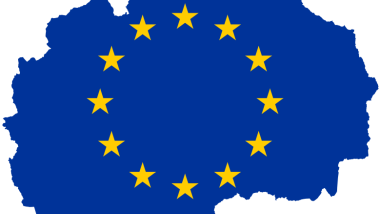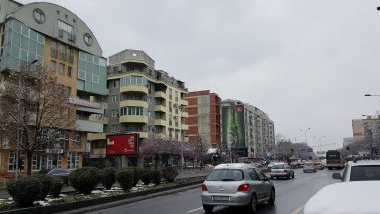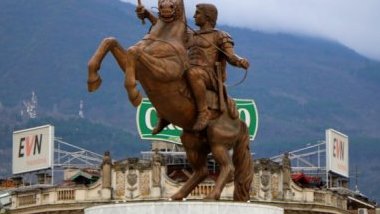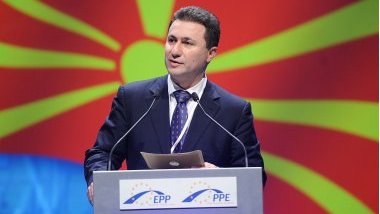The agreement, which was signed between Skopje and Athens three months ago, adds the qualifier “North” to the name of the country to distinguish it from the homonymous Makedonia region in Greece. It also reaffirms Macedonians’ distinctive linguistic and national identity. Most importantly, it removes the biggest obstacle to the country’s accession to the EU and NATO.
The dilemma facing Macedonian voters on Sunday is perfectly captured by the famous concept of a “trolley dilemma” in utilitarian philosophy. Imagine you are standing beside tram tracks. In distance, you spot a runaway trolley hurtling down the tracks towards five workers who cannot hear it coming. There is not enough time for them to move out of the way.
Suddenly, you see a lever connected to the tracks. You realize that if you pull the lever, the tram will be diverted down a second set of tracks away from the five unsuspecting workers. However, down this side track is one lone worker, just as oblivious as his colleagues. So, would you pull the lever, leading to one death but saving five?
If Macedonians vote “yes” in Sunday’s referendum, they will consign the constitutional name of their country, Republic of Macedonia, to history. By contrast, if they reject it (i.e., if they don’t “pull the lever”), in theory they won’t have done anything immoral: the status quo of Greece obstructing their future will merely continue (i.e. the train will stay its course and kill the five people standing in its way). In practice, however, rejecting the referendum is hardly an innocent act: by doing so, Macedonians would become complicit in Greece’s blockade and would help doom their own country to permanent international isolation.
Here are ten reasons why Macedonians are likely to “pull the lever” and vote “yes” on Sunday.
1. Accession to the EU and NATO
It all comes down to this: Macedonia will never achieve its constitutionally enshrined geostrategic objectives of joining Western institutions without reaching an agreement with Greece first. It won’t matter whether Macedonia meets the accession criteria or not as long as its Southern neighbor – a long-term, veto-holding member of both institutions – refuses to let it in. With more than 75% of Macedonian voters constantly supporting integration into both institutions, the choice is simple.
2. Unanimous and unambiguous international support
Apart from the emotional pain of having to change their own name, Macedonians are worried about two other things: that Greece won’t respect the agreement, and that the EU won’t let them in anyway. Leading Western officials have gone out of their way to assuage their fears. Over the last few months, Skopje has been visited by a truly impressive line-up of world leaders, including but not limited to British Prime Minister Theresa May, German Chancellor Angela Merkel, U.S. Secretary of Defense Jim Mattis, and NATO General Secretary Jens Stoltenberg. The most explicit and convincing message came from Mr. Stoltenberg: all you need to do to join NATO is vote “yes”.
3. Tacit bipartisan support
Every serious political party in the country has a vested interest in the referendum succeeding, with the country’s fortunes being tied so closely to its outcome. This applies especially to the main opposition party, VMRO-DPMNE (Party for Macedonian National Unity), which has made its name as a protector of Macedonian identity. VMRO-DPMNE would rather have the current ruling party, SDSM (Social Democrats), change the name (and take the heat for it) than changing it themselves when they are back in power and losing their protector status. Thus, the party has taken a cowardly ambiguous stance of urging their supporters to make up their own mind about the referendum (despite vehemently criticising the Prespa Agreement), instead of encouraging them to boycott the vote.
4. Broad elite consensus
Virtually all former and current high-level political officials in the country have joined forces in supporting the agreement. In an unprecedented display of non-partisan unity, many of VMRO-DPMNE’s founders have joined the “yes” campaign. Support has also come from two former prime ministers, Ljubco Georgievski (VMRO-DPMNE) and Branko Crvenkovski (SDSM), who have held the prime minister post for a combined 12 years.
5. The “Albanian factor”
No one is more enthusiastic about the name change that the country’s ethnic Albanian minority, which amounts to 25% of the population as of the latest census in 2002. With virtually all of the numerous Albanian parties in the country supporting the agreement, Albanian voters will support it with a landslide.
6. The weakness of the “no” campaign
The best illustration of the elite consensus built around the referendum is the fact that not a single parliamentary party opposes the Prespa Agreement. In fact, the “no” campaign consists of a highly eclectic and marginal group of actors, including a far-left, Leninist party, an avowedly pro-Putin party, and a nationalist diaspora movement. Not only are these groups currently out of the parliament; they have never obtained parliamentary representation in their history. Thus, their capacity for popular mobilisation remains scarce.
7. The Prespa Agreement
Needless to say, the Prespa Agreement is far from perfect for the Macedonian electorate, which would much rather not change the name of their country in the first place. However, given Greece’s clearly superior power in the asymmetrical name talks, the Prespa Agreement is nothing but a jackpot for Macedonians. While the agreement does mandate changing the country’s name into Republic of North Macedonia, it also provides guarantees of the distinctiveness of the country’s language and nationality, which Greece has aggressively questioned for decades. Macedonians could not have hoped for a better deal.
8. Resentment towards the former ruling party
After eleven years of rampant corruption and a broad set of misguided economic policies from 2006 until 2017, VMRO-DPMNE’s popularity hit an all-time low. Moreover, after evidence emerged that it had been negotiating a wide variety of possible solutions with Greece behind the scenes for years, the party now has zero credibility to argue that the Prespa Agreement is not the optimal solution. By adopting a consistently transparent approach to the negotiations, SDSM has been trying to distinguish itself from VMRO-DPMNE in this regard and thus garner more support for the agreement.
9. Party-line voting
While otherwise not a desirable phenomenon, Macedonia’s rudimentary political culture increases the likelihood of a successful referendum. Given the hierarchical nature of all political parties in the country, and given SDSM’s strong standing following a sweeping victory in last year’s local elections, SDSM and its Albanian coalition partner DUI should be able to mobilise significant portions of their support base for Sunday’s vote.
10. The sheer length of the name dispute
In the past 27 years, Macedonia has endured interethnic instability, massive brain drain, constant corruption, and extreme levels of air pollution. None of these problems will disappear with the name change, but most of them can be significantly mitigated through EU accession, and all of them can benefit from returning to the public spotlight, which has been captured by an abstract identity discourse for too long.
A successful referendum on Sunday won’t immediately make (North) Macedonia heaven on Earth. But it might just make it a normal country.







Follow the comments: |
|
